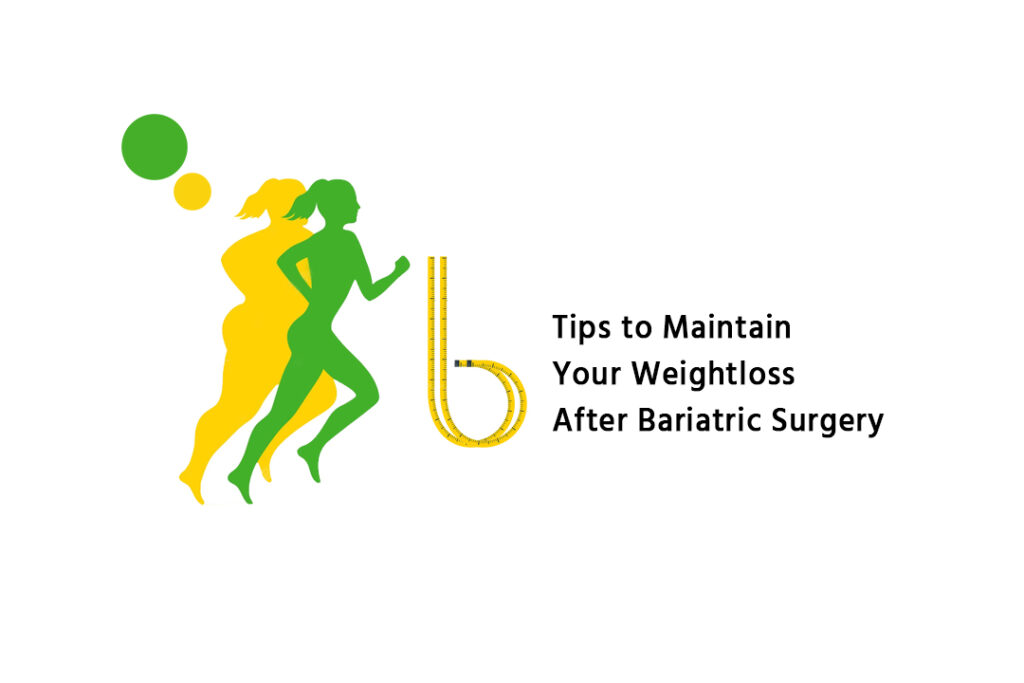
Harshalee Parkar
Bariatric Dietician & Content Writer

6 Tips to Maintain Your Weight Loss After Bariatric Surgery

After undergoing bariatric surgery, it is crucial to adopt strategies to sustain weight loss effectively. This life-saving procedure brings about significant weight reduction, alleviates co-morbidities, and enhances overall well-being and appearance. Nonetheless, achieving long-term success necessitates making lasting dietary changes. Here are some tips to maintain a healthy weight after bariatric surgery:
Eat Your Breakfast -
Make it a habit to consume breakfast each morning. Many individuals already have a routine of eating a consistent, nutritious breakfast every day. Kickstart your day on a positive note by including protein, fruits or vegetables, and fiber in your breakfast. This practice helps to jumpstart your metabolism for the day. Remember, your bariatric surgery was specifically tailored to accommodate smaller food portions consumed multiple times throughout the day, so it’s important not to skip breakfast and compensate by overeating during dinner.
Avoid Continuous Snacking -
To prevent weight regain, it is important to avoid continuous snacking or grazing throughout the day. The primary objective of gastric bypass and adjustable gastric band procedures is to induce a feeling of fullness after consuming small portions of solid food. After meals, your pouch will slightly expand, creating a sense of satiety.
To promote longer-lasting fullness, focus on incorporating solid foods rich in protein and fiber into your pouch. Take charge of your eating habits by planning regular meals and sitting down to enjoy them. Measure the portions of food you intend to eat and consume them one at a time, treating each portion as a complete meal. For example, if you consume a 1 oz or ¼ cup serving of nuts over 2 hours at your desk, you may not feel satisfied. However, if you eat the nuts along with a small piece of fruit as a complete “meal,” you are more likely to feel satiated and less hungry later on.
Limit Liquid Calories -
It’s important to be mindful of the impact of liquid calories on your weight loss and maintenance journey. Similar to grazing, consuming liquid calories can undermine your progress. Liquids pass through the pouch or band rapidly without creating a lasting feeling of fullness. Therefore, it is not advisable to drink immediately after meals as it can accelerate the passage of solid food through your pouch. Additionally, consuming high-calorie fluids is discouraged because your post-surgery anatomy does not provide the same sense of satiety as liquids or liquid-like foods.
Go Easy On The Eating Out -
It’s important to be mindful of your eating habits when dining out, as many people lead busy lives where eating on the go is sometimes unavoidable. Research indicates that consuming meals outside of the home can contribute to weight gain, but it’s also important to recognize the reality of the situation. Just as you have a plan for grocery shopping, it’s beneficial to have a strategy for dining out when necessary.
Being an informed eater involves knowing what you’re going to order and understanding its nutritional content. Most fast food chains and restaurants provide nutrition information on their websites. Utilize these resources by printing them out, highlighting the best options, and keeping a sheet of paper with the best choices from the restaurants you frequently visit in your car. Refer to this list when eating out and ensure that your selection aligns with your meal plan. It’s important to remember that maintaining weight loss involves moderation, which may mean eating out only occasionally. By being aware of what you’re consuming, you can enjoy your meal without feeling guilty about it.
Exercise Daily -
As your weight decreases, it becomes necessary to increase your exercise efforts in intensity, duration, and frequency to burn the same amount of calories. Studies indicate that a person weighing 79 kgs, who previously had higher weight, will require a longer exercise duration compared to a person weighing 79 kgs who has maintained the same weight throughout. According to the 2005 Dietary Guidelines and the National Weight Control Registry, engaging in 60-90 minutes of daily exercise is recommended to prevent weight regain following significant weight loss. In summary, it is important to continuously strive to push yourself further each day and aim for increased exercise activity to support your weight maintenance efforts.
Keep a Plan -
To maintain a consistent eating routine, aim to have meals at planned intervals of approximately every 3-4 hours. Start your first meal within 1-2 hours after waking up and continue to space your meals throughout the day accordingly. The key to successful meal planning is knowing what you will eat before you consume it. Writing down your meal plan on paper is a helpful strategy. Even dietitians create plans before going grocery shopping for the week. Plan your meals for the entire week and transform them into a grocery list. Additionally, take advantage of leftovers by incorporating them into the next day’s lunch. This approach will not only assist you in adhering to your meal plan but also help you save money in the process.






